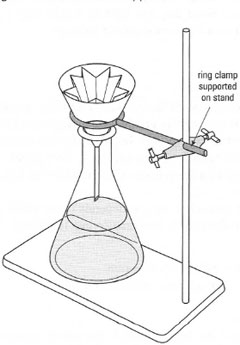What is the difference between gravity filtration and vacuum filtration? When should vacuum filtration be used? What is the difference between copper (II) sulphate trihydrate, copper (II) sulphate pentahydrate, and anhydrous copper (II) sulphate?
1 Answer
See below.
Explanation:
Filtration is the separation of a solid from a fluid by passing the mixture through a medium through which only the fluid can pass.
In gravity filtration, a suspension of a solid in a liquid is allowed to flow by gravity through a porous medium such as a filter paper.

The liquid passes through the pores in the paper, and the solid is retained on the paper.
Vacuum filtration is often used to speed up the filtration process.
The filter paper is placed over the perforated base of a Hirsch or Büchner funnel, and a vacuum is applied to help pull the liquid through the paper.
(from quiz2.chem.arizona.edu)
Copper(II) sulfate trihydrate is copper(II) sulfate with three molecules of water of hydration,
Copper(II) sulfate pentahydrate is copper(II) sulfate with five molecules of water of hydration,
Anhydrous copper(II) sulfate is copper(II) sulfate with no water of hydration,

